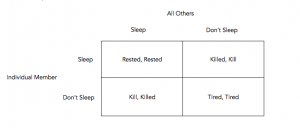Hunger Game(s) Theory
Wired author Samuel Arbesman made some compelling observations about the prevalence of mathematics in The Hunger Games. The first portion of the article covers the probability of having one’s name drawn (which is pretty neat- I suggest reading the full article) while the second portion examines the issue of sleeping and group alliances in a Prisoner’s Dilemma-style game. In the Games, various group alliances and sub-networks within the greater network of all 24 contestants form based around the goal of mutual protection; however, it is the primary goal of every single player in the game to kill all other players in order to win. Arbemans argues that the Dilemma can be set up as being played between two entities (I would say players but one of the “players” is actually more of a collective group): the Individual, as one entity, and All Others in the alliance, as another entity. There are then two strategies: Sleep or Don’t Sleep. While there are a number of consequences associated with these two choices, such as the effect sleep has on performance during normal waking hours, but for simplicity sake this game is analyzing sleep in terms of its effect on the likelihood of being killed, or, in other words, the value of sleep versus the value of life.
According to the model of the Prisoners Dilemma, the game could play out something like this given all possible strategies relating to sleep:

Based on this model, it is clear that the dominant strategy is Don’t Sleep, because if all other members of the group choose to sleep, it is better to stay awake and have the opportunity to kill (or, more realistically, simply bide time and maintain a watch), rather than to be killed. Alternatively, if all other members decide to not sleep, it is still better not to sleep because “it’s better to be tired than to be dead.” Thus the ties between these group members are almost certainly weak, or negative, if we want to look at structural balance, because of the distinct origins of each of the players and the unlikelihood that they have had any sort of chance to bond. Given this, we can assume that the motivation for all other group members to keep the individual alive is likely not very high unless the individual has some unique value, e.g. a skill none of the others possess, affirming that the dominant strategy is to stay awake.
It is also interesting to think about how the game will evolve as the Games progress, meaning that, with increasingly fewer competitors there are remaining, there are ever fewer alliances there are likely to be made. In short, the game becomes a matter of individual vs. individual and the game thus becomes a classic version of the Prisoner’s Dilemma, with two players, both of which can choose a more positive option (sleep) or take a risk (not sleep).
The article:
http://www.wired.com/2012/04/probability-and-game-theory-in-the-hunger-games/
